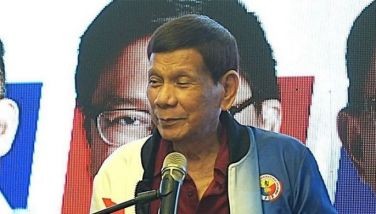Bifurcation

This young year will be a very political one. This happens every three years, given our short electoral cycle.
The midterm elections happening in May will be intensely contested. The results will provide a measure of the political support the ruling coalition has. It will also provide a reading of political alignments leading to the crucial presidential elections of 2028.
2024 gave us a foretaste of the intense politicking forthcoming. Driven by centrifugal forces, the UniTeam coalition collapsed. The coalition won the 2022 elections by a landslide and assembled an unprecedented supermajority thereafter. But there is not enough, evidently, to hold this coalition together.
Like Humpty Dumpty, who fell from the wall, this coalition could not be put together again. The rants have happened. The factional lines have been drawn. The antagonisms are simply too deep. The competing political agendas are simply irreconcilable.
All the sparring between the contending factions took its toll. Trust and approval ratings for the two highest officials of the land have eroded beyond repair. The seasonal public opinion surveys are like a barometer forecasting a political storm.
Vice President Sara Duterte’s survey ratings are most visible. Over the last two quarters, her trust ratings slipped remarkably across all demographic groups. With the prospect of impeachment proceedings being initiated at the House of Representatives, her ratings are expected to suffer even more.
Although she is still holding on to her Mindanao constituency, support for her has declined in all other regions. The loss of support is quite marked among urban voters and most stark among college-educated young voters. This will have grave implications for whatever political designs she might nurse for the 2028 presidential elections.
The only thing that might console her is that all the major political personalities are suffering dropping trust and approval ratings. This trend diminishes the legitimacy of the ruling factions.
As this happens, the number of undecided voters increased from 13 to 17 percent. This indicates the growing factional chasm is resulting in voter skepticism rather than in firmer affiliation with one or the other grouping.
There are many factors feeding into the stream of rising disenchantment. Inflation, driven primarily by food prices, continues to take its toll on public confidence. The reforms people expected are not being delivered with any urgency. Corruption is spreading like wildfire.
Instead of addressing the sources of public disenchantment, the political elite tries to conserve support through patronage politics. We see this clearly in the way the 2025 budget was mangled to induce public dependence on dole-outs rather than in building the people’s economic sovereignty.
2025 will be a turbulent year worldwide. Wars are breaking out in many places. There is economic distress everywhere. Populist politics is producing more uncertainty.
Should a major global emergency happen, the 2025 national budget does not equip our government with the means for an effective response. It is not possible, should equity markets collapse, for our government to mount counter-cyclical measures. We cannot import our way out of food shortages. All we have is an impotent pork barrel designed to keep people happy for only a day.
The most poignant indicator of our helplessness is that less people, according to the surveys, are hopeful about the future. We have always been a very hopeful people. Even in the worst calamities, hopefulness carried us through. Now, that characteristic is eroding.
In an election year, the political class will be obsessed with playing political games. But voters are becoming more alienated. Less, not more, of our people now see political action as the means to redemption. Less, not more, of our people see the major political players as the heroes who will save our struggling nation.
What we are seeing is a bifurcation between the political elite and the citizens they imagine to be governing. The more intense the political play, the less interested our people are in the political players.
What we are seeing is the spread of political alienation. That imperils our democratic practice. As they struggle to make ends meet, fewer Filipinos see the state as the means for economic prosperity. Dole-outs will not win back public enthusiasm for democratic engagement.
The pork barrel budget signed this week adds to the public distrust for those who govern them. This is not healthy.
Carter
Former president Jimmy Carter has died at the age of 100. The world mourns the passing of a beloved statesman.
Carter may not have been America’s best president in the single term he served. But he was certainly among the most decent leaders the world has known. He accomplished more in the 43 years after he left the White House, pursuing humanitarian causes and engaging in peace-building around the world.
Carter’s crowning achievement is the peace deal he brokered between Egypt and Israel. In that accord, Egypt became the first Islamic country to recognize Israel’s right to exist. Unfortunately, this deal failed to win peace in the Middle East.
Carter’s worst foreign policy defeat is Iran. His emphasis on putting human rights first led his administration to abandon the Shah of Iran and allow the radical Islamists led by Khomeini to take power. In the end, the capture of US diplomats and the bungled attempt to rescue them proved to be Carter’s undoing.
Still, Jimmy Carter reminds us of a time, long gone, when one could be both a gentleman and a politician.
- Latest
- Trending






























